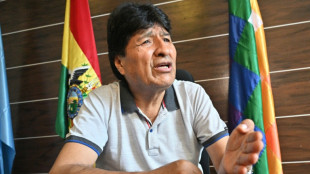
-
 UK counter-terrorism unit probes rappers Kneecap but music stars back band
UK counter-terrorism unit probes rappers Kneecap but music stars back band
-
Yamal heroics preserve Barca Champions League final dream

-
 2026 T20 World Cup 'biggest women's cricket event in England' - ECB
2026 T20 World Cup 'biggest women's cricket event in England' - ECB
-
Bangladesh begins three days of mass political rallies

-
 Children learn emergency drills as Kashmir tensions rise
Children learn emergency drills as Kashmir tensions rise
-
Millions of children to suffer from Trump aid cuts

-
 Veteran Wallaby Beale set for long-awaited injury return
Veteran Wallaby Beale set for long-awaited injury return
-
Syria's Druze take up arms to defend their town against Islamists

-
 Tesla sales plunge further in France, down 59% in April
Tesla sales plunge further in France, down 59% in April
-
US calls on India and Pakistan to 'de-escalate'

-
 Israel reopens key roads as firefighters battle blaze
Israel reopens key roads as firefighters battle blaze
-
Europe far-right surge masks divisions

-
 James will mull NBA future after Lakers playoff exit
James will mull NBA future after Lakers playoff exit
-
Ukraine's chief rabbi sings plea to Trump to side with Kyiv

-
 Australian mushroom meal victim 'hunched' in pain, court hears
Australian mushroom meal victim 'hunched' in pain, court hears
-
Lakers dumped out of playoffs by Wolves, Rockets rout Warriors

-
 Booming tourism and climate change threaten Albania's coast
Booming tourism and climate change threaten Albania's coast
-
US reaching out to China for tariff talks: Beijing state media

-
 Tariffs prompt Bank of Japan to lower growth forecasts
Tariffs prompt Bank of Japan to lower growth forecasts
-
Kiss faces little time to set Wallabies on path to home World Cup glory

-
 Serbian students, unions join forces for anti-corruption protest
Serbian students, unions join forces for anti-corruption protest
-
Slow and easily beaten -- Messi's Miami project risks global embarrassment

-
 Fan in hospital after falling to field at Pirates game
Fan in hospital after falling to field at Pirates game
-
Nuclear power sparks Australian election battle

-
 Tokyo stocks rise as BoJ holds rates steady
Tokyo stocks rise as BoJ holds rates steady
-
Bank of Japan holds rates, lowers growth forecasts

-
 'Sleeping giants' Bordeaux-Begles awaken before Champions Cup semis
'Sleeping giants' Bordeaux-Begles awaken before Champions Cup semis
-
Napoli eye Scudetto as Inter hope for post-Barca bounce-back

-
 Germany's 'absolutely insane' second tier rivalling Europe's best
Germany's 'absolutely insane' second tier rivalling Europe's best
-
PSG minds on Arsenal return as French clubs scrap for Champions League places

-
 UK WWII veteran remembers joy of war's end, 80 years on
UK WWII veteran remembers joy of war's end, 80 years on
-
Myanmar junta lets post-quake truce expire

-
 Rockets romp past Warriors to extend NBA playoff series
Rockets romp past Warriors to extend NBA playoff series
-
Messi, Inter Miami CONCACAF Cup dream over as Vancouver advance

-
 UN body warns over Trump's deep-sea mining order
UN body warns over Trump's deep-sea mining order
-
UK local elections test big two parties

-
 US judge says Apple defied order in App Store case
US judge says Apple defied order in App Store case
-
Seventeen years later, Brood XIV cicadas emerge in US

-
 Scorching 1,500m return for Olympic great Ledecky in Florida
Scorching 1,500m return for Olympic great Ledecky in Florida
-
Israel's Netanyahu warns wildfires could reach Jerusalem

-
 Istanbul lockdown aims to prevent May Day marches
Istanbul lockdown aims to prevent May Day marches
-
Moderna Reports First Quarter 2025 Financial Results and Provides Business Updates

-
 DEA Unconstitutional Marijuana Hearing - MMJ to File Emergency Injunction and Suit for Irreparable Harm
DEA Unconstitutional Marijuana Hearing - MMJ to File Emergency Injunction and Suit for Irreparable Harm
-
Formation Metals Announces Appointment of Adrian Smith to Advisory Committee

-
 Cerrado Gold Announces Q4 And Annual 2024 Financial Results
Cerrado Gold Announces Q4 And Annual 2024 Financial Results
-
Australian guard Daniels of Hawks named NBA's most improved

-
 Mexico City to host F1 races until 2028
Mexico City to host F1 races until 2028
-
Morales vows no surrender in bid to reclaim Bolivian presidency

-
 Ukraine, US sign minerals deal, tying Trump to Kyiv
Ukraine, US sign minerals deal, tying Trump to Kyiv
-
Phenomenons like Yamal born every 50 years: Inter's Inzaghi


Mexico's energy reforms test relations with US
Relations between the United States and Mexico are under strain as the Mexican government pushes ahead with planned energy sector reforms that have alarmed Washington and foreign investors.
President Andres Manuel Lopez Obrador wants to strengthen the state-owned electricity provider and roll back the effects of liberalization under previous governments that he says favored private companies.
That has prompted warnings that Mexico is in danger of violating its commitments under a North American trade deal with the United States and Canada by prioritizing state-run entities heavily dependent on fossil fuels.
In November, Lopez Obrador's ruling party pushed back its deadline for the approval of a constitutional reform bill until April, following a backlash from the United States, Canada and foreign investors.
The next few months "will be critical," a US diplomatic source in Mexico told reporters on condition of anonymity.
A row between the neighboring countries would have potential consequences for wider cooperation in key areas such as trade, migration and fighting drug cartels.
The reforms would ensure that the state-owned Federal Electricity Commission (CFE) has at least 54 percent of the electricity market -- compared with 38 percent now -- and the private sector no more than 46 percent.
The government says the move is to prevent soaring power prices -- a hot-button political issue given inflation has hit a 20-year high above seven percent.
The reforms also aim to move towards a state monopoly in the exploration and mining of lithium, a vital material in the production of electric car batteries.
In January several US Democratic party senators urged President Joe Biden's administration to "more forcefully express concerns about President Lopez Obrador's detrimental fossil fuel agenda."
The blunt call came in a letter to Secretary of State Antony Blinken and Secretary of Energy Jennifer Granholm from Senate Foreign Relations Committee chairman Bob Menendez and three other members of Congress.
"If enacted, the Mexican government would cancel renewable energy permits, contracts, and certificates," they warned.
The legislation would "threaten at least $44 billion in private investment in Mexico's energy sector, will negatively impact US private sector investment in Mexico, and is antithetical to the historically strong US-Mexico economic relationship," they said.
- Investments at stake -
"One of the most controversial points of the reform has been its proposal to cancel all the contracts that were signed with private companies for the generation and supply of electricity," said the Mexican branch of the international auditing and consultancy network Deloitte.
"This possibility is worrying different players in the market, because the private sector has invested a large amount of resources in the construction and start-up of modern facilities capable of producing cleaner and cheaper electricity," it added.
Following suggestions that the changes could even amount to a form of indirect expropriation, Mexico's Energy Minister Rocio Nahle said this week that "not a single screw will be expropriated."
The United States has found itself fighting on the same side as domestic opponents of the reforms, which must be approved by two-thirds of the members of Congress.
They include Senate ruling party heavyweight Ricardo Monreal, who wanted the bill to be amended, as well as the governors of northern states such as Baja California and Sonora bordering the United States.
Baja California wants to stay connected "to the fourth largest economy in the world, which is California," said the US diplomatic source.
Washington says it is also concerned that the reform will favor polluting coal-based energy, to the detriment of renewable energy.
Nahle has dismissed such suggestions as a "lie," saying that only three percent of Mexico's electricity comes from coal, compared with some 20 percent in the United States and more than 50 percent in China.
"Each country adapts to the resources it has, and on this point we are not going to criticize others," the minister said, in what was seen as a jab at Washington.
O.Norris--AMWN